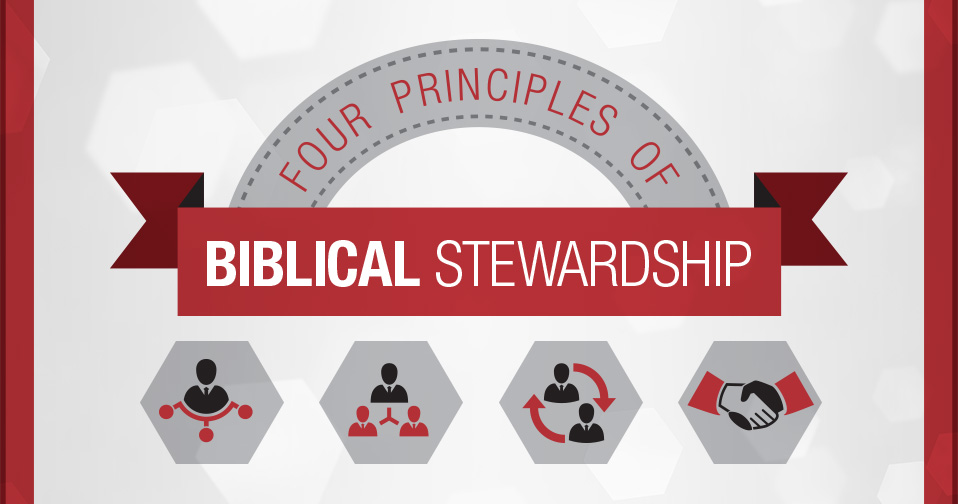Original Post found here. by Hugh Welchel
What does stewardship look like in our lives today? What does it look like in our businesses? Unfortunately, many Christians today only associate the idea of stewardship with sermons they have heard about church budgets and building programs. The idea of biblical stewardship is much more expansive. It is where the concepts of faith, work, and economics intersect. There are four important principles about biblical stewardship we must understand if we are to lead our businesses, our churches, our communities, and our families in a way that honors God. In developing this framework for unpacking biblical stewardship, I’ve learned in part from ideas set out by Bill Peel, founding executive director of the Center for Faith and Work at LeTourneau University, in his excellent essay “Leadership Is Stewardship”.
The Principle of Ownership
The psalmist begins the 24th Psalm with,“The earth is the LORD’s, and everything in it, the world, and all who live in it.”
In the beginning of Genesis, God creates everything and puts Adam in the Garden of Eden to work it and to take care of it. It is clear that man was created to work and that work is the stewardship of all of the creation that God has given him. This is the fundamental principle of biblical stewardship. God owns everything, and we are simply managers or administrators acting on His behalf.
Therefore, stewardship expresses our obedience regarding the administration of everything God has placed under our control, which is all-encompassing. Stewardship is the commitment of one’s self and possessions to God’s service, recognizing that we do not have the right of control over our property or ourselves. Echoing Deuteronomy 8:17, we might say: “My power and the strength of my hands have produced this wealth for me.” But Deuteronomy 8:18 counsels us to think otherwise:
“Remember the LORD your God, for it is He who gives you the ability to produce wealth.” The fact that we are managers doesn’t mean we merely preserve creation, like a park ranger. Instead, we are gardeners, cultivating the areas of creation placed under our responsibility. Your work is the area of creation God has given you to manage on His behalf. He’s given you the ability to steward it well.
The Principle of Responsibility
In explaining responsibility, Peel writes, “Although God gives us ‘all things richly to enjoy’, nothing is ours. Nothing really belongs to us. God owns everything; we’re responsible for how we treat it and what we do with it. While we complain about our rights here on earth, the Bible constantly asks, ‘What about your responsibilities?’ Owners have rights; stewards have responsibilities.”
We are called as God’s stewards to manage that which belongs to God. While God has graciously entrusted us with the care, development, and enjoyment of everything He owns as His stewards, we are responsible to manage His holdings well and according to His desires and purposes.
The Principle of Accountability
A steward is one who manages the possessions of another. We are all stewards of the resources, abilities, and opportunities that God has entrusted to our care, and one day each one of us will be called to give an account for how we have managed what the Master has given us.
This is the maxim taught by the parable of the talents. God has entrusted authority over the creation to us and we are not allowed to rule over it as we see fit. We are called to exercise our dominion under the watchful eye of the Creator, managing His creation in accord with the principles He has established.
Like the servants in the parable of the talents, we will be called to give an account of how we have administered everything we have been given, including our time, money, abilities, information, wisdom, relationships, and authority. We will all give account to the rightful owner as to how well we managed the things he has entrusted to us.
The Principle of Reward
In Colossians 3:23-24 Paul writes: “Whatever you do, work at it with all your heart, as working for the Lord, not for men, since you know that you will receive an inheritance from the Lord as a reward. It is the Lord Christ you are serving.”
The Bible shows us in the parables of the kingdom that faithful stewards who do the Master’s will with the Master’s resources can expect to be rewarded incompletely in this life, but fully in the next. We all should long to hear the Master say what He exclaims in Matthew 25:21: “Well done, good and faithful servant! You have been faithful with a few things; I will put you in charge of many things. Come and share your master’s happiness!”
As Christians in the 21st century, we need to embrace this larger biblical view of stewardship, which goes beyond church budgets or building projects, though important; it connects everything we do with what God is doing in the world.
We need to be faithful stewards of all God has given us within the opportunities presented through His providence to glorify Him, serve the common good, and further His kingdom.

